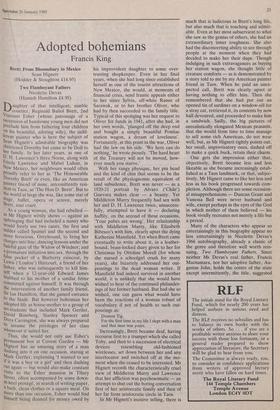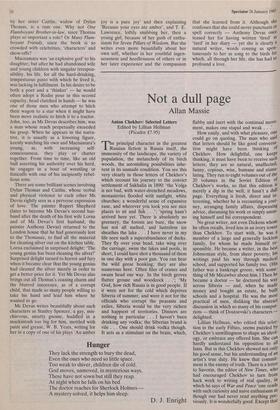Adopted bohemians •
Francis King
Brett: From Bloomsbury to Mexico Sean Hignett (Hodder & Stoughton £14.95) Two Flamboyant Fathers Nicolette Devas (Hamish Hamilton £4.95)
Daughter of that intelligent, nimble courtier, Reginald Baliol Brett, 2nd Viscount Esher (whose patronage of a succession of handsome young men did not preclude him from fathering four children on his beautiful, adoring wife), the indif- ferent painter who is here the subject of Sean Hignett's admirable biography was christened Dorothy but came to be Doll to her family. In her later years, as one of D. H. Lawrence's three Norns, along with Frieda Lawrence and Mabel Luhan, in New Mexico, her neighbours would often proudly refer to her as 'The Honourable Dorothy Brett' or even, like an American painter friend of mine, intermittently resi- dent in Taos, as 'The Hon D. Brett'. But to the world at large she was, like some star of stage, ballet, opera or screen, merely Brett, tout court.
As a young woman, she had rebelled as Mr Hignett wittily shows — against an upbringing that had included a nanny who would freely use two canes, the first and milder called Spaniel and the second and More ferocious, Greyhound, to bring her charges into line; dancing lessons under the baleful gaze of the Widow of Windsor; and a premature initiation into sex, through the false pocket of a Burberry raincoat, by Lewis (`Loulou') Harcourt, a friend of her father, who was subsequently to kill him- self when a 12-year-old Edward James blabbed to his mother of a similar betise committed against himself. It was through the intervention of another family friend, Sir Ian Hamilton, that she gained entrance to the Slade. But however bohemian her adopted life as house-mother to a group of art-students that included Mark Gertler, David Bomberg, Stanley Spencer and Dora Carrington, she was always prepared to assume the privileges of her class Whenever it suited her.
Thus, she would not only use Esher's Permanent box at Covent Garden — Mr Hignett has an amusing story of a man dashing into it on one occasion, staring at Mark Gertler, explaining 'I wanted to see if it was a boy or a girl' and then dashing out again — but would also make constant visits to the Esher mansion in Tilney Street, often accompanied by some down- at-heel protégé, in search of writing-paper, a bath, clean clothes or a square meal. On more than one occasion, Esher would find himself being dunned for money owed by
his improvident daughter to some over- trusting shopkeeper. Even in her final years, when she had long since established herself as one of the tourist attractions of New Mexico, she would, at moments of financial crisis, send frantic appeals either to her sister Sylvia, off-white Ranee of Sarawak, or to her brother Oliver, who had by then succeeded to the family title.
Typical of this sponging was her request to Oliver for funds in 1941, after she had, in her own words, 'plunged off the deep end and bought a simply beautiful Pontiac station wagon, a dream of loveliness'.
Fortunately, at this point in the war, Oliver had the law on his side. 'We here can do nothing,' he wrote piously. 'The hard heart of the Treasury will not be moved, how- ever much you starve.'
With her rangy physique, her pin head and the kind of chin that seems to be the result of the physiognomic equivalent of land subsidence, Brett was never — as a 1920-21 portrait by Alvaro (`Chile') Guevara makes clear — a beauty. Yet Middleton Murry frequently had sex with her and D. H. Lawrence twice, unsuccess- fully, attempted to have it — declaring huffily, on the second of these occasions, 'Your pubes are wrong'. Her relationship with Middleton Murry, like Elizabeth Bibesco's with him, clearly upset the dying Katherine Mansfield. Yet when Brett came eventually to write about it, in a leather- bound, brass-locked diary given to her for Christmas by Ottoline Morell (for whom she nursed a schoolgirl crush for many years), she bizarrely addressed her out- pourings to the dead woman writer. If Mansfield had indeed survived in another world, it is unlikely that she would have wished to hear of the continued philanddr- ings of her former husband. But had she so wished, one can guess what would have been the reactions of a woman robust of vocabulary if not of health to such out- pourings as: Dearest Tig,
For the first time in my life I slept with a man and that man was yours.
Increasingly, Brett became deaf, having recourse first to a trumpet which she called
Toby, and then to a succession of electrical devices resembling old-fashioned wirelesses, set down between her and any interlocutor and switched off at the mo- ment when she ceased to be interested. Mr Hignett records the characteristically cruel view of Middleton Murry and Lawrence that her affliction was psychosomatic — an attempt to shut out the boring conversation first of her aristocratic family and then of her far from aristocratic circle in Taos.
In Mr Hignett's incisive telling, there is much that is ludicrous in Brett's long life, but also much that is touching and admir- able. Even at her most subservient to what she saw as the genius of others, she had an extraordinary inner toughness. She also had the disconcerting ability to see through people at the moment when they had decided to make her their dupe. Though indulging in such extravagances as buying her station wagon, she thought little of creature comforts — as is demonstrated by a story told to me by my American painter friend in Taos. When he paid an unex- pected call, Brett was clearly upset at having nothing to offer him. Then she remembered that she had put out an opened tin of sardines on a window-sill for a stray cat, retrieved it, its contents by now half devoured, and proceeded to make him a sandwich. Sadly, the big pictures of unrealistically elongated Mexican peasants, that she would from time to time manage to sell some rich American, do not wear well; but, as Mr Hignett rightly points out, her small, improvisatory ones, dashed off to make a quick buck, retain their charm.
One gets the impression either that, objectively, Brett became less and less likeable as she became increasingly estab- lished as a Taos landmark, or that, subjec- tively, Mr Hignett came to like her less and less as his book progressed towards com- pletion. Although there are some occasion- al misapprehensions — Duncan Grant and Vanessa Bell were never husband and wife, except perhaps in the eyes of the God in which neither of them believed — his book vividly recreates not merely a life but a period.
Many of the characters who appear so entertainingly in this biography appear no less entertainingly in Nicolette Devas's 1966 autobiography, already a classic of the genre and therefore well worth reis- suing, Two Flamboyant Fathers. Since neither Ms Devas's real father, Francis Macnamara, nor her adoptive father, Au- gustus John, holds the centre of the state except intermittently, the title, suggested
by her sister Caitlin, widow of Dylan Thomas, is a rum one. Why not One Flamboyant Brother-in-law, since Thomas plays so important a role? Or Many Flam-' boyant Friends, since the book is so crowded with celebrities, 'characters' and show-offs?
Macnamara was 'an explosive god' to his daughter; but after he had abandoned wife and young children with singular irrespon- sibility, his life, for all the hard-drinking, tempestuous gusto with which he lived it, was lacking in fulfilment. In his desire to be both a poet and a 'thinker' — he would often adopt a Rodin pose in this second capacity, head clutched in hands — he was one of those men who attempt to hitch their wagon to a star when it might have been more realistic to hitch it to a tractor. John, too, as Ms Devas describes him, was a man whose reach perpetually exceeded his grasp. When he appears in the narra- tive, it is usually as a lowering figure, keenly watching his own and Macnamara's young, as, with increasing self- consciousness, they play or chatter together. From time to time, like an old bull asserting his authority over his herd, he engages in a bout of wrestling or fisticuffs with one of his incipiently rebel- lious sons.
There are some brilliant scenes involving Dylan Thomas and Caitlin, whose verbal and physical violence to each other Ms Devas rightly sees as a perverse expression of love. The painter Rupert Shepherd (later to become Ms Devas's second hus- band after the death of his first wife Lorna and of Ms Devas's first husband, the painter Anthony Devas) returned to the London house that he had generously lent to the Thomases, to find all the material for cleaning silver out on the kitchen table. Lorna exclaimed in surprised delight: 'The young genius has been cleaning the silver!' Surprised delight turned to horror and fury when it became clear that the young genius had cleaned the silver merely in order to get a better price for it. Yet Ms Devas also brings out all Thomas's coaxing charm and the blurred innocence, as of a corrupt child, that made so many people willing to take his hand and lead him where he wanted to go.
Ms Devas writes beautifully about such characters as Stanley Spencer, a gay, mis- chievous, smutty gnome, huddled in a mackintosh too big for him, mottled with paint and grease, W. B. Yeats, writing for her in a copy of one of his plays 'An amber joy is a pure joy' and then explaining `Because your eyes are amber', and T. E. Lawrence, loftily snubbing her, then a young girl, because of her gush of enthu- siasm for Seven Pillars of Wisdom. But she writes even more beautifully about her own self, whether in her youthful ingen- uousness and heedlessness of others or in her later experience and the compassion
that she learned from it. Although she confesses that she could never punctuate or spell correctly — Anthony Devas once teased her for having written 'tired' as `turd' in her diary — yet she is clearly a natural writer, words coming as spon- taneously to her as song to the birds for which, all through her life, she has had so profound a love.











































 Previous page
Previous page